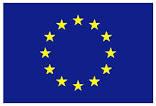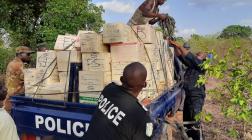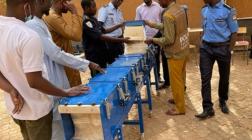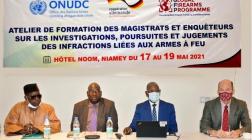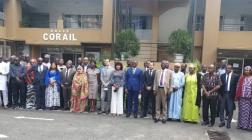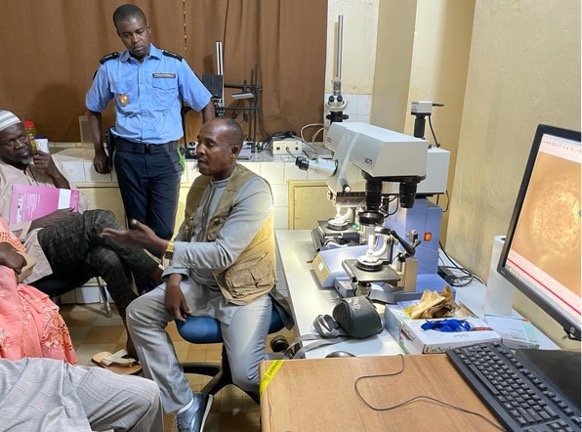
UNODC Global Firearms Programme Capacity building workshop on the use of forensic sciences in firearms related investigations in Niger
From 5 to 8 April 2022, the UNODC Global Firearms Programme organised a capacity building workshop on the use of forensic sciences in firearms related investigations in Niamey, Niger. The workshop targeted magistrates and investigators in various Nigerien institutions and is part of the overall support of UNDOC to the country in its efforts to improve the prevention of illicit firearms trafficking. The training was made possible by the contribution of the European Union, as part of its Global Illicit Flows Programme.
The workshop was aimed at strengthening the capacities of different actors in the criminal justice chain in the field of forensics and consequently training them to better investigate and gather as much evidence as possible. The workshop allowed participants to strengthen their capacities on the national legal framework related to firearms and the use of forensics and ballistics; national and regional forensic institutions; use of forensics evidence during investigations; prosecution and adjudication in firearms offences cases, inter alia. The training included exercises and simulations conducted in cooperation with the National Forensic Laboratory. Participants strengthened their capacities to collect evidence on firearms and ammunition; ballistics analysis; gun powder residue identification in hands and clothes; restoration of deleted serial numbers on firearms and identification of the distance and position of shooters.
The project “Countering transnational illicit arms trafficking through the implementation of the United Nations Convention Against Transnational Organized Crime and its Firearms Protocol” has as its overall objective to prevent and counter the illicit manufacturing of and trafficking in firearms, and their links to transnational organised crime and terrorism, through the ratification and implementation of the Protocol against the Illicit Manufacturing of and Trafficking in Firearms, their parts and Components and Ammunition, supplementing the United Nations Convention Against Transnational Organized Crime (UNTOC). The project is implemented by the Global Firearms Programme (GFP), established by the first project funded by the European Union (EU) (IFS /2010 /259-204), which builds upon five interconnected pillars, including: (1) adequate policy and legislative frameworks, (2) implementation of comprehensive firearms control and regulatory frameworks, (3) effective criminal justice responses to illicit trafficking and related crimes, (4) broad international cooperation and regular exchanges of information and expertise through communities of practitioners, and (5) enhanced knowledge and intelligence on firearms trafficking to monitor illicit trafficking flows.
The project’s outcomes aim at supporting these interconnected building blocks, and the activities programmed in order to achieve them include four outputs, namely: (1) increase awareness of the firearms issue and its international responses, and adequate policy and legislative frameworks in place, in line with relevant international and regional instruments; (2) increase capacities of countries and sub-regions to implement effective firearms control regimes in line with the Firearms Protocol and other relevant instruments, and to prevent, investigate and prosecute firearms trafficking and related offences through effective national response and international law enforcement and judicial cooperation; (3) support effective cooperation and sharing of information and good practices among communities of firearms and organised crime/terrorism practitioners, through regular contacts and use of specialised cooperation networks and platforms and taking advantage of existing initiatives; and (4) improve capacity to monitor, analyse and identify synergies for firearms legislation and case-law with and amongst other forms of transnational organised crime, including cybercrime, money laundering, illicit drug trafficking, smuggling of migrants, or terrorism, inter alia.


